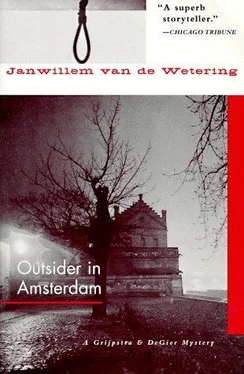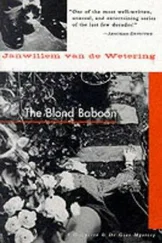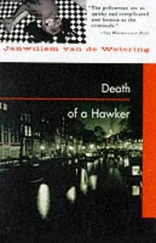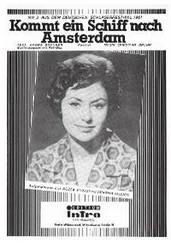Janwillem De Wetering - Outsider in Amsterdam
Здесь есть возможность читать онлайн «Janwillem De Wetering - Outsider in Amsterdam» весь текст электронной книги совершенно бесплатно (целиком полную версию без сокращений). В некоторых случаях можно слушать аудио, скачать через торрент в формате fb2 и присутствует краткое содержание. Жанр: Полицейский детектив, на английском языке. Описание произведения, (предисловие) а так же отзывы посетителей доступны на портале библиотеки ЛибКат.
- Название:Outsider in Amsterdam
- Автор:
- Жанр:
- Год:неизвестен
- ISBN:нет данных
- Рейтинг книги:4 / 5. Голосов: 1
-
Избранное:Добавить в избранное
- Отзывы:
-
Ваша оценка:
- 80
- 1
- 2
- 3
- 4
- 5
Outsider in Amsterdam: краткое содержание, описание и аннотация
Предлагаем к чтению аннотацию, описание, краткое содержание или предисловие (зависит от того, что написал сам автор книги «Outsider in Amsterdam»). Если вы не нашли необходимую информацию о книге — напишите в комментариях, мы постараемся отыскать её.
Outsider in Amsterdam — читать онлайн бесплатно полную книгу (весь текст) целиком
Ниже представлен текст книги, разбитый по страницам. Система сохранения места последней прочитанной страницы, позволяет с удобством читать онлайн бесплатно книгу «Outsider in Amsterdam», без необходимости каждый раз заново искать на чём Вы остановились. Поставьте закладку, и сможете в любой момент перейти на страницу, на которой закончили чтение.
Интервал:
Закладка:
"It was," de Gier said, "but we are still stuck. This is merely a diversion. I applied for normal duty today because I couldn't think of anything else to do and I didn't want to sit in the office. Tonight we go and see the drug dealers."
"Yes, we are stuck," Grijpstra said, "we have been stuck before. We'll be unstuck again."
The radio began to crackle.
A deep, slightly hoarse, female voice said the call number of their car.
"That's Sientje," Grijpstra said. "Let me talk to her." He took the microphone.
"One three," he said, "over."
"What's your position?" Sientje asked.
"Het Singel, close to the Jeroenensteeg, going north," Grijpstra said.
"Right, just where I want you. Please go the corner of Singel and Brouwersgracht. There should be the dead body of a young girl or woman in one of the houseboats. I don't know which one."
"Crime?" Grijpstra asked.
"That's all I know," Sientje said. "Out."
"Lovely voice," de Gier said. "I wouldn't want to meet her."
"Why not?"
"She may be a disappointment."
Grijpstra settled back in his seat and held on. De Gier had switched the siren on and above them the blue light sparked silently. The narrow Singel's traffic tried to make way for them and the VW raced dangerously at forty kilometers an hours, two wheels on the sidewalk.
"Easy," Grijpstra said, and smiled.
De Gier looked ferocious, the top of his body stiffly erect, hands clasped to the steering wheel, jaws firmly closed and chin jutting out.
"A captain on a destroyer's bridge," Grijpstra thought, "plunging into the attack. A fighter pilot, zooming his powerful jet plane down into the desert to explode a row of tanks. A commando officer, all set to jump down from his helicopter hovering six feet above the ground, tom-mygun ready-and all the poor boy is doing is driving a little biscuit tin on the sidewalk, and he is armed with a thirty-two pistol loaded with bullets that will go haywire after fifty feet."
But de Gier enjoyed himself as he screamed through a red light. He regretted that he was so close to his goal. Just another few hundred yards.
The inevitable crowd was waiting for them, some thirty people huddled close together, muttering to each other. A narrow corridor opened and de Gier said, "Excuse me," and pushed through it.
The boat was old, a wreck, built from second-hand materials on the hulk of a small discarded river freighter. Its paint had peeled off long ago.
A youth waited for them on the plank that served as a gangway.
"A user," Grijpstra thought as he brushed past him.
Thin unwashed hair framing the face of a living skeleton dressed in a pair of torn jeans, rope-slippers and a shirt that had lost most of its buttons.
"Very far gone," de Gier thought, "hard drugs, heroin probably." He looked into the boy's eyes and saw the small pupils, contracted into black pinpoints.
"She is inside," the boy said. "Please go inside."
Grijpstra had switched on his flashlight. He couldn't see much. The curtains were drawn and the windows hadn't been washed for years. There wasn't any furniture. A small paraffin stove with a kettle, a few cups on the floor. A dirty carpet and some blankets. He bent down to study the small shape underneath the blankets.
The girl wouldn't be over nineteen, perhaps she was even younger. She was lying on her back, her mouth had fallen open and her dead eyes were staring at the rotten planks of the boat's roof.
"Who are you?" a voice behind them said.
"Police," de Gier said.
"Sorry," the brother-officer of the Municipal Health Service said. "I didn't recognize you, sergeant. It's dark in here. Just let me have a look at her."
Grijpstra made room for him and shone his torch on the girl's face. The Health Serviceman pulled the blanket down and grunted.
"Dead," he said. "Suffocated in her own vomit. Nice. If that clot had turned her over she would have been all right, but he probably didn't notice she couldn't breathe. Too busy, of course. You see, her pants haven't been fastened. Must have covered her up later, when he saw that there was something wrong."
"Stretcher," the officer said to his mate.
De Uier didn't hear. He was outside, in the street, leaning against a lamp post and trying not to be sick. Grijpstra joined him.
"I can't stand that sort of thing," de Gier said.
"Who can?" Grijpstra asked.
"I'll never get used to it," de Gier said.
"Who will?" Grijpstra asked.
"Did you see her arms?" de Gier asked.
"Of course. Pricks all over, what would you expect? Probably has three or four shots a day. Doesn't eat anymore, just drinks a bit. Thin as a rake. She would have died anyway, another year at the most." The Municipal Health men maneuvered past them, very carefully, and carried the stretcher toward the ambulance and blocked the street.
'Where are you taking her?" de Gier asked.
"City hospital," said the officer who had talked to them before. "We left her bag in the boat; perhaps there'll be some identification in it. Your doctor happens to be in the city hospital; the post mortem will probably be done before you get there."
De Gier waved and the ambulance started. They didn't use their siren; a corpse has all the time in the world.
"Let's get on with it," Grijpstra said and put a hand on the boy's shoulder. "Come into the boat with us, we'd like to ask a few questions."
They asked the usual questions and the young man answered, but on another level, perhaps from another dimension. He talked in circles and commented on what he said. De Gier remembered another boy he had arrested once in the middle of Leidse Square where he was jumping up and down, waving, shouting and disturbing traffic. In the station he had chased something, something invisible and had run with his head against the wall and collapsed bleeding. Whatever he had been chasing had gone through the wall.
"He is in another world," Grijpstra said to de Gier when the youth went into another long monologue.
"Yes," said de Gier, "but we have to find out what we have to find out," and patiently they continued their questions and slowly some understandable answers were produced. They learned his name and profession. A student.
"What do you study?"
"I study life."
"Psychology?" de Gier asked. "Philosophy?"
"Sociology."
Grijpstra looked through the boat. There wasn't a scrap of a paper to be found, no ballpoint, no books.
"Did you ever pass any examinations?"
"Yes, a long time ago now. I am a candidate."
"You stopped?"
The boy began to ramble again. He hadn't stopped, but he hadn't gone to lectures anymore.
"The needle?" de Gier asked.
The boy sneezed a few times.
"He needs the needle now," Grijpstra said.
They turned to the crime. There was no crime, the youth said, he had met the girl in the Dam square. He had asked her to come to his boat with him. They had slept together, she had died. De Gier admitted to himself that there had been no crime. The girl must have been over nineteen years old, and crime stops at the last day of a minor's fifteenth year, unless, of course, in case of rape. They couldn't even prove that he had seduced the girl. She must have come of her own free will, nobody had dragged her to the boat. And he had reported her condition as soon as he had become aware of it. No, no crime. So there would be no arrest.
Grijpstra looked through the girl's handbag. It contained a pack of cigarettes, a dirty handkerchief and a purse with less than twenty guilders. And a needle, and some heroin in a small plastic bag.
"Can I have that?" the boy asked.
"Is it yours?"
"No."
"You couldn't have it even if it was yours, we'll need it as evidence."
"Of what?" the boy asked.
"Death," Grijpstra said.
Читать дальшеИнтервал:
Закладка:
Похожие книги на «Outsider in Amsterdam»
Представляем Вашему вниманию похожие книги на «Outsider in Amsterdam» списком для выбора. Мы отобрали схожую по названию и смыслу литературу в надежде предоставить читателям больше вариантов отыскать новые, интересные, ещё непрочитанные произведения.
Обсуждение, отзывы о книге «Outsider in Amsterdam» и просто собственные мнения читателей. Оставьте ваши комментарии, напишите, что Вы думаете о произведении, его смысле или главных героях. Укажите что конкретно понравилось, а что нет, и почему Вы так считаете.












